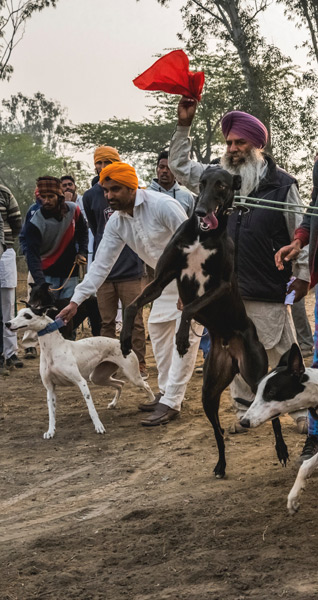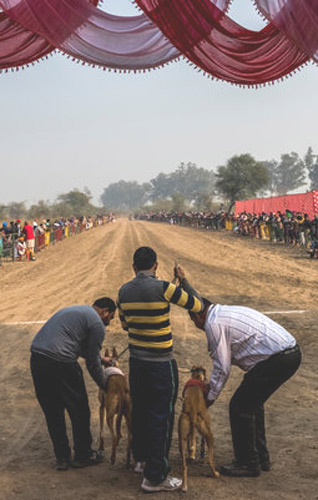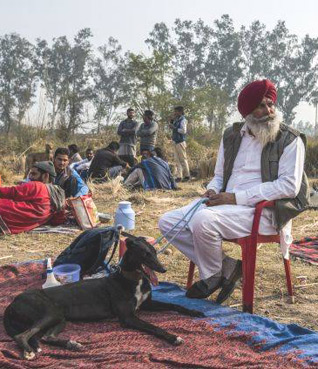Travel
Depths Of Decadence:
Why Punjab & India Are Going To The Dogs
ELLEN BARRY
Faridkot, Punjab, India
A column of 4-by-4s turned off a dusty road in rural Punjab last week, past ox carts and farmworkers holding sickles, and came to a stop in an unmarked field. Servants circled around to the backs of the vehicles and unloaded, ever so carefully, the animals everyone had come to see.
There were greyhounds from Canada, from Ireland and England, and a few from the United States. The track of plain tractor-groomed dirt belied the colossal investment represented by the dogs, many of which are housed in air-conditioned kennels and fed buttermilk and chicken.
Dogs are a big deal in this part of Punjab, about 20 miles from the border with Pakistan. So is single-malt Scotch, skeet shooting and wild-boar pickle. The guardians of these traditions can be found seated in a row of chairs arranged at the finish line: wealthy Sikh landowners who, despite the Indian government’s attempts to dismantle the feudal system, are keeping alive the ways of the maharajahs and nawabs who came before them.
One of the most prominent among them, Kushaldeep Singh Dhillon, was scanning the track for a glimpse of a 17-month-old brindle bitch named Baby Doll. This was complicated, at times, by the number of young men coming by to bend down and touch his feet.
“All the big families are into dogs,” said Kushaldeep, who is known as Kiki. “You import the best dog. You have the best handler. It’s not the horse competing, or the dog competing. It’s the man’s name competing.”
He estimates the cost of a top greyhound at half-a-million rupees, or about $7,500. This is a fraction of what he will pay for a Marwari stallion, a Perazzi shotgun or a big-game hunt in South Africa, but, still, it adds up.
“Very few families have been left with all this, I’ll be very frank,” he said. “This is a bit of an expensive thing, the dogs, the upkeep.”
The trainers arrive first, laying thick blankets on the ground for the greyhounds, which bruise easily. Then come the dogs’ owners, recognizable by their quilted vests and Gucci sunglasses, walking at the head of V-shaped formations of cousins, like geese.
Many wealthy families here own chains of gas stations in the United States or Canada, and most have relatives there. One imposing man, who turned out to be a police officer, explained in rapid-fire fashion that “I am doing duty as a gunman for Kiki Dhillon” and that “my in-laws are settled in Modesto.”
Like every aspect of life here, dog racing was violently interrupted by the partition in 1947, which divided Punjab (between the two newly created countries of Pakistan and India) and forced Sikh landowners to choose between living in the Muslim state of Pakistan, and possibly being forced to convert, or parting with vast tracts of land that were now under Pakistan and fleeing to a Hindu-majority India.
Those who chose India had to contend with a government intent on land redistribution; in 1972, new laws banned ownership of plots of irrigated land exceeding seven hectares -- about 17 acres -- and, to add insult to injury, outlawed hunting. Greyhounds, as a result, can be legally raced only using a mechanical lure, in this case a bedraggled dead rabbit affixed to a dinner plate.
Kushaldeep’s 95-year-old uncle, Karam Singh, ran the hounds with the Maharajah of the Sikh kingdom of Faridkot as a young man, and could recall the king’s horsemen galloping into the fields and planting red pennants to denote the presence of a rabbit.
Karam had agreed to attend Monday’s race out of affection for the dogs, but when asked his opinion, grimaced as if he had just eaten a lemon.
“This is a nonsense thing,” he said. “It is not a race.”
He acknowledged that hunting was being phased out in many places, including England, where, as he put it, “The people in Parliament, they cry like children, they say ‘I don’t want.’ ”
Feudal ways have clung stubbornly here, nevertheless, in part because a family’s land can be registered piecemeal, or under multiple names -- the younger Kushaldeep reckons his family controls more than 300 acres, though exact figures are understood to be confidential. Meanwhile, old-line landowning families dominate party politics (Punjab’s most popular politician, the former chief minister Capt. Amarinder Singh, was the heir to the former Sikh princely state of Patiala.)
Even without the benefit of elected office, the scions of old families serve as a kind of shadow government. Kushaldeep is an excellent example. Though he lost his most recent parliamentary election, he still spends several hours a day receiving petitioners who wait on his terrace, bringing him their problems and occasionally asking him to settle disputes.
They refer to him as “Sardar” -- an honorific used for all Sikh males, akin to “chieftain.”
“Communism was never a hit in North India,” he said. Kushaldeep’s family owns interstate buses and trades in liquor, but he spends most of his time on politics. He has four cellphones, two of which are in the possession of his personal secretary, and they ring approximately every five minutes, including when he is on horseback.
“The main job for politicians is not to make laws, the main job is to go to social functions,” he said, a little wearily. “There are all these deaths.”
Dog races offer some relief from this routine. A man turns a crank, the dead rabbit scoots down the track on a wire and two dogs shoot out at a full gallop, their spines flexing like springs. Dust rises around the men along the track: farmers with deeply lined faces; New Jersey gas station moguls; one princeling in aviator sunglasses who described himself happily as “that type of guy, you give me $100,000, I guarantee within two, three days, I am spending every penny.”
Kushaldeep, seated beside a race official, was fretting a bit over his dogs. His favorite, Messi, though “bloody fast,” had apparently lost enthusiasm when he realized the rabbit was mechanical. He blamed his trainers for overexerting Messi’s sister, Smarty, which he considers “the fastest bitch in Punjab,” and instructed them to raise the body weight of a third sibling, Ronaldo, by seven pounds.
In the end, Monday’s top prizes went to the dogs belonging to Punjabis living in North America; one of them, an electrical engineer, lives outside Detroit and raced a dog from West Virginia. Back on his veranda at his home, Kushaldeep said he was no stranger to disappointment; last year, he was preparing to travel to Ireland for a coursing championship, in which dogs chase a live rabbit, when his dog broke a leg in training and had to be euthanized.
“They are like glass, you never know when they will crack,” he said. “You put all this effort into them and after two races they bloody crash.”
Anyway, there was plenty to look forward to. The authorities in some areas of Punjab have categorized wild boar as vermin. This allows hunters to drive the boars into fields of sugar cane, send a pack of hounds to flush them out, and wait on the periphery with shotguns. A friend who had come for the dog races offered, as he left, to send over a pair of gray partridges, and Kushaldeep’s face brightened.
“Give me a pair of white peacocks,” he said. “I’d love to have them wandering around.”
[Courtesy: The New York Times. Edited for sikhchic.com]
January 10, 2016
Conversation about this article
1: Jasbir Kaur (New Jersey, USA), January 10, 2016, 9:29 AM.
Aren't these the idiots who recently self-identified themselves back to being a 'low-caste Backward class'? It's their self-designation, not mine. Why are we now surprised that they behave and live like the scum of the earth?
2: Devjot Singh (Ludhiana, Punjab), January 10, 2016, 9:34 AM.
Playing the fiddle while Rome burns ....!
3: Gurbaksh Singh (Chicago, Illinois, USA), January 10, 2016, 9:37 AM.
It's time to cut these parasites down to size and make them work for a living. Until and unless we do so, Punjab will burn and continue to sink to the level of India.
4: Tony Singh (Canada), January 10, 2016, 2:21 PM.
Nice article. Nice to see an article describing Punjabis enjoying hobbies instead of the usual about violence and strife in the province. There is more to Punjab than the usual negative coverage.
5: Jaimal Singh Gill (Patiala, Punjab), January 10, 2016, 3:51 PM.
The verbatim quotes from these parasites are hilarious. I guess they hadn't heard of the adage: "Better to remain silent and be thought a fool than to speak and remove all doubt!"
6: Dr Birinder Singh Ahluwalia (Toronto, Ontario, Canada), January 12, 2016, 5:18 AM.
This article, being sandwiched between portraits of Canadian Defence Minister Harjit Singh Sajjan, conveys a profound (but somewhat amusing) message about the diversified makeup of the Sikh community across the globe ... involved in a whole gamut of activities.
7: H. Kaur (Canada), January 12, 2016, 6:43 PM.
I don't see how India or Punjab is going to the dogs because of these people. At least they treat their dogs well, though I do wish they were nicer to the wild pigs. As far as I can see, these people are rich due to having rich ancestors and still generating wealth including through gas stations in America. They seem to be bringing wealth from another country to India too. I remember reading about someone who studied families. He found that families tend not to change across the generations. Successful ones have children who are also successful ones. Those who aren't, still aren't several generations later. At least in North America people have the hope that their kids can go into a higher class than themselves while in India, the Hindu caste system doesn't allow that.
8: Kaala Singh (Punjab), January 19, 2016, 12:10 PM.
Inspite of having huge land holdings and gas stations, etc. in America and elsewhere, I can bet that these guys are not paying for water and electricity!





